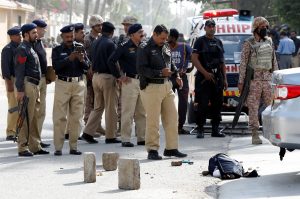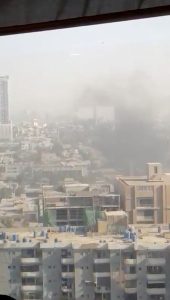
By Rupam Jain and Abdul Qadir Sediqi
KABUL (Reuters) – The Taliban killed more than 100 members of the Afghan security forces inside a military compound in central Maidan Wardak province on Monday, a senior defense official said.
“We have information that 126 people have been killed in the explosion inside the military training center, eight special commandoes are among the dead,” said a senior official in the defense ministry in Kabul, speaking on condition of anonymity.
The official said the assault began on Monday morning when the attackers rammed a car full explosives through a military check point and detonated the vehicle inside the campus of the National Directorate of Security (NDS) forces training center in Maidan Shahr, the capital of Maidan Wardak province.
Two gunmen entered the campus right after the explosion and shot at many Afghan soldiers before being gunned down during the clashes.
Defense ministry officials said the Taliban had used U.S.-made armored Humvee vehicles captured from Afghan forces as a car bomb in order to breach the military fortifications.
A second source residing in Maidan Wardak province said more than 100 members of National Directorate of Security (NDS) were killed in the complex attack.
“I have been in touch with the NDS official in the province and they told me that over 100 members of the NDS were killed in the big explosion,” the former provincial official said.
Sharif Hotak, a member of the provincial council in Maidan Wardak said he saw bodies of 35 Afghan forces in the hospital.
“Many more were killed. Several bodies were transported to Kabul city and many injured were transferred to hospitals in Kabul,” said Hotak, adding that “the government was hiding the accurate casualty figures to prevent a further dip in morale of the Afghan forces.”
“The explosion was very powerful. The whole building has collapsed,” he said.
Government officials in Maidan Wardak and Kabul declined to comment when asked if they were obscuring the death toll.
Two senior officials in the interior ministry said the exact casualty figures was not being disclosed to prevent unrest within the armed forces.
“I have been told not to make the death toll figures public. It is frustrating to hide the facts,” said a senior interior ministry official in Kabul.
A senior NDS official in Kabul said at least 50 people were killed or wounded in the complex attack.
Abdurrahman Mangal, spokesman for the provincial governor in Maidan Wardak said 12 people were killed and 12 were injured when the car bomb exploded near the Afghan special forces unit.
President Ashraf Ghani’s office in a statement said the “enemies of the country” had carried out an attack against NDS personnel in Maidan Shahr. “They killed and wounded a number of our beloved and honest sons.”
In recent years the Afghan government has stopped releasing detailed casualty figures. Last year Ghani has said 28,000 Afghan police officers and soldiers have been killed since 2015, breaking the longstanding suppression on casualty data.
Taliban insurgents claimed responsibility for the attack. Zabiullah Mujahid, a spokesman for the hardline Islamic militant group said they have killed 190 people in the complex attack.
Last week, Taliban fighters set off a car bomb outside a highly fortified compound killing at least five people and wounding more than 110 Afghans and expatriates in the capital, Kabul.
(Additional reporting by Sayed Hassib, Charlotte Greenfield in Kabul, Ahmad Sultan in Jalalabad; Editing by Raissa Kasolowsky)









